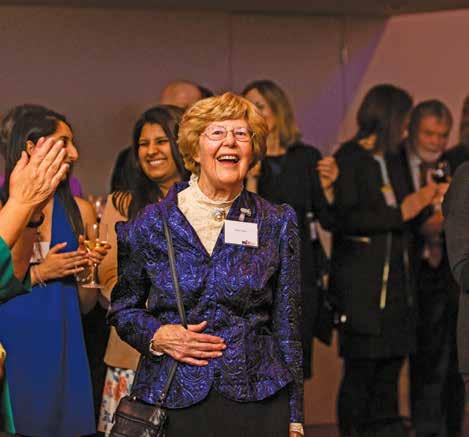
2 minute read
Reflections on nutrition and the Nutrition Society
Valmai M Hedley (Griffith) M.HSc (NZ) FRSPH
In 1941 when the Nutrition Society was formed, I was 15 years old and had already decided that I wanted to study Nutrition. I was influenced by the nutrition I was taught in the science classes of the two secondary schools in New Zealand which I attended, where in one, the textbook was “Everyday Nutrition” by E Neige Todhunter, who had gained her PhD under Professor HC Sherman, Columbia University, and in the other, the textbook was “Good Nutrition” by Professor E Gregory and Muriel Bell, both of whom had gained their doctorates under Professor Jack Drummond, University of London.
In both of these textbooks, I noted that the first half was devoted to the principles and science of nutrition, and the other half to the practical aspects such as menu planning and the provision of nutritionally balanced daily meals for families at reasonable cost. It gave me an overall view of the complexity of the wide ranging field of nutrition, and the understanding that good health may depend on the amount and type of food that is eaten over a lifetime.
In my first degree at the University of Otago, New Zealand, I was given a sound knowledge of both the science and the practical side of nutrition. In our practical nutrition classes we used McCance and Widdowson “Chemical Composition of Foods”, and “Nutritive Value of Wartime Foods” (I still have my, somewhat worn, copies).
I was well aware of the Nutrition Society and the Proceedings, when in 1951 I was working towards a Master’s degree in Nutrition at the University of Otago. I was involved the investigation of long chain protein molecules and the cross-linkages, using a number of techniques such as X-ray crystallography. When the elucidation of DNA came two years later, I sensed a possible connection between genetics, diet, lifestyle and longevity as at this time,
I was investigating the story of my direct line antecedents who were early settlers to New Zealand, many of whom had lived into their 80s and 90s. I am now interested in Nutritional Genomics and Epigenetics.
After three years lecturing in Food and Nutrition, I travelled to London and was persuaded by Dr A. Molly Copping to join them at Queen Elizabeth College to lecture for the new degree in Nutrition. She introduced me to the Nutrition Society, which I joined in 1956 and was privileged to be her guest at the dinner to celebrate the 15th anniversary of the founding of the Nutrition Society. I have since attended many meetings and conferences, especially since retiring 30 years ago, and enjoyed celebrating the
50th anniversary in Cambridge and the 70th in Reading, where I joined in with the enthusiasm generated by the formation of the professional body, Association for Nutrition (AfN), which regulates the registration of nutritionists who are qualified to give advice founded on evidence based science.
Being a member of the Nutrition Society over the years has been a great support and asset, especially when one has retired and has no academic base. It has meant that in the last thirty years, I have been able to meet with past colleagues, keep up with the latest research and also sample the enthusiasm of the younger generation whom the Society encourages.




